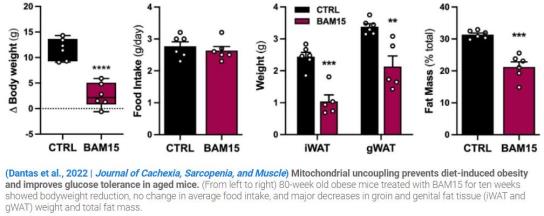'Fat-burning' molecular therapy linked to muscle loss with age
Adults with sarcopenic obesity are at high risk for long-term disability, worsened quality of life, and death, representing a serious public health concern. So, interventions that prevent, delay, or reverse the causes and consequences of sarcopenic obesity may reduce morbidity and enhance lifespan in older adults.
Mitochondria are the primary site of energy production and thus highly influence muscle function. Aging is associated with several mitochondrial derangements and is exacerbated by obesity. “Loss of muscle mass is
typically not a concern in younger adults with obesity. However, as people age, that changes. Older adults with sarcopenic obesity suffer accelerated muscle loss. They become less active. As a result, they are at high risk for falls, stroke, heart disease, poorer quality of life, and premature death,” said Christopher Axelrod, MS, Director of Pennington Biomedical Research Center’s Integrated Physiology and Molecular Medicine Laboratory.
Interestingly, targeting mitochondria with compounds called “uncouplers” confers lifespan extension in rodents and insects. However, the effects of mitochondrial uncouplers in sarcopenic obesity had been minimally explored.
In this study, Dantas and colleagues treated 80-week old and overweight mice with the mitochondrial uncoupler BAM15 for ten weeks, which conferred protection against sarcopenic obesity in aged mice. BAM15 treatment
prevented diet-induced obesity while effectively protecting against the loss of muscle mass and function with additional improvements in overall metabolic health.

“Typically, when you lose weight, you also lose muscle, and in some circumstances, you can lose a lot of it,” Axelrod said. “In this study, the aged mice increased their muscle mass by an average of 8 percent, their strength by 40 percent, while they lost more than 20 percent of their fat.” BAM15 is distinguished from other uncouplers by its ability to maintain lean mass after weight reduction. The lack of compensatory food intake in mice fed BAM15 is psychologically important because the reward center in the brain is intimately connected with food consumption; therefore, targeting metabolic efficiency with mitochondrial uncoupling may not be associated with the same psychological risk profile as dieting or using pharmacological agents that
target satiety.
References: https://www.nmn.com/news/mitochondrial-modulator-treats- age-related-muscle-loss



